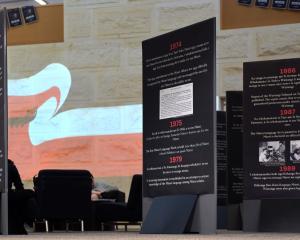It's good to see Rosemary Penwarden outlining her concerns and for Shell to have the right to respond, something we were unable to do in our recent meeting in Dunedin brought to a halt by other protesters.
Shell welcomes any discussion, including on climate change, so long as it has a chance to present its views. Whether there is oil or natural gas present in any basin is not determined by us or any opponents, but by nature. We have strong scientific evidence, including information from wells previously drilled in the Great South Basin, that we can expect to find gas there, with some associated liquid gas ''condensate''; the chance of finding oil is very low. The first step is to prove the presence of hydrocarbons as part of the exploration phase. It is too early to talk about options for future development concepts, assuming the presence of hydrocarbons is proven.
Shell did not leave anything off the table with our Environmental, Social and Health Impact Assessment.
At the earliest opportunity we were presenting some of the preliminary findings in order to get feedback. Rafting birds were indeed identified as potentially being affected in the very unlikely case of an uncontrolled release of gas and condensate. Much research was included on the feeding and migratory patterns of rafting birds, including albatross and shearwaters.
Shell operates under detailed processes, using the latest equipment and technology to minimise any credible risk a drilling spill could have on birds and marine life, particularly whales and dolphins. If we proceed to drilling, we will have a complete range of responses to deal with the consequences of any spill, however unlikely.
The video footage acquired by Niwa's research vessel Tangaroa under contract to Shell does indeed indicate there is little marine life apparent on the surface seabed at the potential drilling site. Shell received the video footage only a few days before the meeting and chose to share it. Our preliminary conclusion is that drilling a single exploratory well over a month would have very limited impacts. We are open to further input.
Shell does not take lightly its often stated commitment to environmental and personal safety. We are a major player worldwide and publish our performance on environmental metrics on an annual basis. The number and volume of operational spills has steadily reduced over recent years but we continue to learn from all our incidents to improve our performance further in the future.
For the record, we were not involved in the 2010 Horizon disaster in the Gulf of Mexico, or the Elgin platform gas leak in the North Sea. We agree that the health and safety record for New Zealand is poor across all industries compared with Britain and other countries. The head of Shell New Zealand, Rob Jager, is at present chairing the Government's Independent Taskforce on Workplace Health and Safety.
As for Nigeria, as recently as last week, the US Supreme Court refused to hear a case attempting to link Shell with claims of human rights abuses in the Niger Delta - claims that Shell has always strongly denied. Shell remains firmly committed to supporting fundamental human rights, including those of peaceful protest. Shell acknowledges improvements can be made to our operations there and has made significant progress in reducing spills and gas flaring in recent years. It is important to note that the vast majority of spilt oil in Nigeria is caused by rampant criminality - oil theft and illegal refining. This leads to widespread environmental damage and is the real tragedy of the Niger Delta.
Shell shares concerns about climate change and we see gas as a clean and affordable energy source. Wind, solar and bio fuels are some 1% of the energy mix today and they will have an important role to play beyond 2030. Over the past five years, we have spent US$2.2 billion on developing alternative energies, carbon capture and storage, and other CO2-related R&D.
But industry will need to see more technology development to make renewables cost-competitive with hydrocarbons and less reliant on subsidy; we are working on that for the long term. We do not have coal reserves. Our 2012 total production was split almost equally between oil and gas. Given that natural gas has around half the carbon emissions of coal and about a third that of diesel, this should provide some common ground for discussions on how we address climate change in a world with ever-increasing energy demands. We remain committed to debating all these issues and urge anyone with an interest in New Zealand's energy future to engage constructively with us.
- Roland Spuij, Shell's New Zealand exploration manager.









